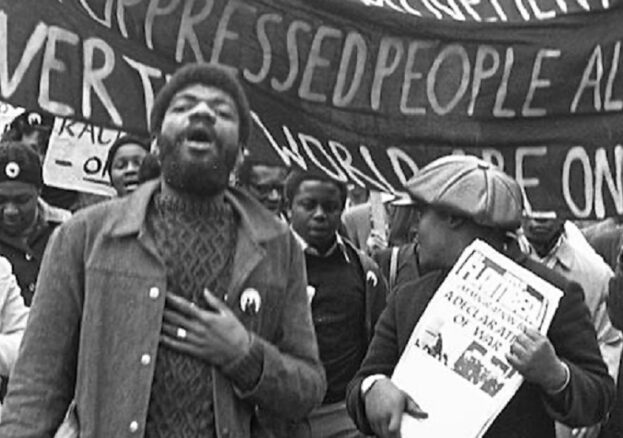
Concepts of ‘race’ and racism are central to British history. They have shaped, and been shaped by, British identities, economies and societies for centuries, from seventeenth-century enslavement in the Caribbean to the ‘hostile environment’ of the 2010s.
Yet state and societal racism has always been met with resistance. Britain has been home to anti-slavery societies, Pan-African Congresses, and anti-fascist organisations. At a more quotidian level, even those who might not have identified as anti-racist have challenged the racism of their peers, bosses and friends in informal ways. People have challenged and reshaped notions of ‘Britishness’ through dress, art and staking their claim to British identity. The conference will explore the trends and patterns of British anti-racism — its continuities and discontinuities, its fusions and fissions — in order to understand how anti-racism has shaped Britain, and the possibilities for the anti-racist struggles of today and tomorrow.
Day 1 – Saturday 20 February 2021
09:30-09:45
Welcome
09:45-11:00
Hakim Adi’s opening lecture
Anti-racism: A British Tradition
11:00-11:15
Break
11:15-12:30
Panel 1: The State and Citizenship
Christopher Fevre, ‘There is no justice here for the coloured man’: Challenging Racist Policing in Britain, 1919-1959
Amy Grant, A Strange Sanctuary: State, Hate, and God in Late Twentieth Century Britain
Virgillo Hunter, The Windrush Scandal: Migration, Citizenship, Family and Belonging
12:30-13:15
Break
13:15-14:30
Panel 2: Music and Culture
Benjamin Bland, Morrissey, the Music Press, and the Contested Meanings of Anti-Racism in Contemporary British Youth Culture
Jessica Chow, Black Against the Stave: Black Modern Girls in British Interwar Jazz
Vanessa Mongey, Student on the move: Showcasing African culture in the North
14:30-14:45
Break
14:45-16:00
Panel 3: Anti-racism and Identity
Talat Ahmed, Tartan Inclusivity or Workers Internationalism: The origins of St Andrew’s Day Anti-racism March and Rally
Joseph Finlay, Jewish responses to ‘race’ and racism in postwar Britain
16:00-16:15
Break
16:15-17:30
Panel 4: The Spatial and Gendered Dimensions of Anti-racist Activism during the Black Power Era in Britain
Zalirah Cooper, The Black British North: Establishing Space and Forming Resistance in the North (1970s-80s)
Jessica White, ‘One of the best days of my life was when I met Olive’: Olive Morris in Manchester, 1975-1978
Kerry Pimblott, “To visit and meet, learn and observe”: Black British Women and Activist Travel to the People’s Republic of China, 1964-1979
Day 2 – Saturday 27 February 2021
09:30-09:45
Welcome
09:45-11:00
Panel 5: Exploring Transnational Politics of Anti-racism, 1880-1960: Chances, Limits and Legacies
Alison Holland, ‘Constant dripping wears away a stone’: The British Legacy of Anti-Slavery in Australia. Towards an Antiracism History.
David Killingray, Action to counter race discrimination in Britain from the 1880s to 1913
Felix Lösing, False empathy: The British Congo reform movement and white saviourism
11:00-11:15
Break
11:15-12:45
Panel 6: Stop the Seventy Tour
Geoff Brown, Tony Collins, Christabel Gurney, Peter Hain, Christian Høgsbjerg, Pete Loewenstein and Elizabeth Williams
12:45-13:30
Break
13:30-14:45
Panel 7: Memory and Engaging with the Past
Megan Hunt, ‘An American-centric understanding of black history and identity.’ Martin Luther King, Jr. and the African American Freedom Struggle in British schools
Sophia Siddiqui, Anti-racist feminism: engaging with the past in the present
Patrick Soulsby, ‘History has to be reckoned with…’: Anti-racist memory cultures of British colonialism and the Holocaust, c. 1980-2001
14:45-15:00
Break
15:00-16:00
Archives and anti-racism
With Anya Edmond-Pettitt (Institute of Race Relations)
16:00-16:15
Break
16:15-17:30
Panel 8: London and Anti-racism
Martin Evans, Fires in two post-colonial Babylons: Some reflexions on a comparative and connected history of anti-racist movements in London and Paris 1976-1985
Finnian Gleeson, Memory, Generation, and Anti-racist Practice in Postcolonial London: The Case of Docklands
Gil Shohat, Colonialism and National Socialism: On the Politics of Comparison in British and Pan-African Anticolonial Circles in the 1930s
Organising committee: Saffron East (University College London); Grace Redhead (University of Warwick); Theo Williams (Durham University)
Contact information
Email: antiracism2020@gmail.com
Twitter: @Antiracism2021
